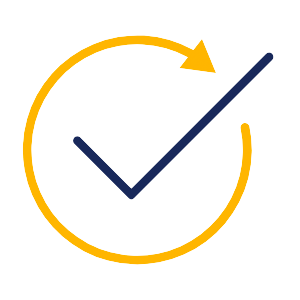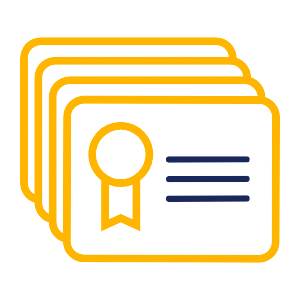$50 application fee waivers available for a limited time. Contact an enrollment advisor for details.
Online Master’s in Health Informatics (MSHI) at the University of Pittsburgh
Revolutionize the business of health care with the Online Master’s in Health Informatics (MSHI) program from Pitt. Build the strategic expertise and technical skills to broaden your impact.
Request Information

36 Credits

4 Tracks

4 Certificates

16 to 24 Months to Complete
*The estimated time to complete your degree depends upon the number of credit hours taken each semester.
Accreditation
Master of Science in Health Informatics Program Student Outcomes:
This data was collected for the time period of September 1, 2021 – August 31, 2022.
- – Number of admitted students: 106
- – Number of matriculated students: 88
- – Number of students either graduated or active in the program: 77
- – Time to completion of program: 16-24 months (depending on part-time or full-time status of the student)
Please Note: Our Department is initiating a ‘teach-out’ phase with the Registered Health Information Administrator Track of the HI Master’s program. Starting in Fall 2022, we are no longer accepting students to apply to the RHIA track. Information regarding the track on our website is still available for the benefit of existing students pursuing the degree. If you have any questions or concerns, please contact Dilhari DeAlmeida at drd7@pitt.edu.
The Master of Science in Health Informatics program is in Candidacy Status, pending accreditation review by the Commission on Accreditation for Health Informatics and Information Management Education (CAHIIM).

Help Make Health Care More Effective and Efficient
Lead in the Business of Health Care with the Pitt MSHI
Online Master’s in Health Informatics (MSHI) Program Benefits
Overview
Expand your career opportunities and impact at the intersection of health care, business management and technology with our Online Master’s in Health Informatics (MSHI) program, delivered online through the Department of Health Information Management at the School of Health and Rehabilitation Sciences.
We take a hands-on, data-driven approach to teach you the technical skills you need to translate information into meaningful insights. With the flexibility of part-time and full-time options as well as four specializations and four certificate options, we offer the individualized education you need to achieve your career goals.
In addition to the online program, Pitt SHRS also offers the MS program and certificates in an on-campus format.
The Online Master’s in Health Informatics (MSHI) program is in Candidacy Status, pending accreditation review by the Commission on Accreditation for Health Informatics and Information Management Education (CAHIIM).
Tracks
Online Master’s in Health Informatics (MSHI) students can choose from four tracks and four additional certificate options, enabling you to personalize your education to your professional goals:
Data Science
The Data Science track provides you with the tools to analyze, extract, and present data to the health care community. You can develop the technical skills to help health care organizations make well-informed, data-driven decisions.
The Data Science Track will:
- – Teach you how to extract information from large and complex datasets, visualize it and communicate it to C-suite executives and health care providers alike.
- – Enable you to help health care systems and organizations identify and implement performance improvement opportunities, especially in relation to quality measurement, patient outcomes and financial performance.
The Data Science Track is for:
- – Professionals who want to learn data analysis (pattern identification, hypothesis testing, risk assessment) and prediction (machine learning models that predict the likelihood of an event occurring in the future, based on known variables).
- – Those who want to manage large databases with multiple types of data from different sources.
- – Those who want to use data from multiple sources to guide their decision-making.
General Health Informatics
The Health Informatics (HI) track trains you in the evaluation and management of health information technologies and systems. You will learn to analyze, design, and evaluate health information systems. This track will help you develop the skills to perform data analytics projects that improve health care while reducing costs.
Health Care Supervision and Management
The Health Care Supervision and Management (HSM) track enables you to acquire advanced skills in administration and supervisory management in all health care settings, including acute care, long-term care, and rehabilitation. You will focus on organizational and leadership development in combination with health care management so you can execute change in the complex and dynamic health care landscape.
The HSM Track will:
- – Help you advance into administrative, management or team leadership positions throughout the health care industry.
- – Equip you with the interpersonal and interdisciplinary skills needed to work alongside diverse teams.
- – Prepare you to lead teams and impact organizational culture effectively.
The HSM Track is for:
- – Professionals looking to develop leadership skills to advance within their field.
- – Those from any professional background who aim to lead and supervise teams or departments.
- – Individuals who communicate across multiple teams and levels of an organization and aspire to lead decision-making and day-to-day operations.
- – Those who seek to impact organizational culture through supervising others and managing operational units.
Health Services Analytics
The Health Services Analytics (HSA) track builds your knowledge of the clinical, fiscal, administrative, ethical, and legal requirements of health care institutions. You will learn to analyze, design, implement and evaluate health information systems effectively and consistently. The program prepares you to interact with other health care professionals and administrators and provide health care data for patient care, research, quality improvement, strategic planning, reimbursement, and related analytics and managerial functions.
Certificates
You may earn one of the four certificates while completing the Online Master’s in Health Informatics (MSHI) program by taking the required courses listed. If all courses in the requested certificate are covered by the track, you will be required to take at least two additional courses to fulfill the certificate requirement.
Students who complete a certificate program and want to continue to pursue the MSHI program may transfer at most 6 credits from the certificate program to the MSHI program.
Certificate in Health Data Analytics (12 credits)
- HI 2022 – Introduction to Python for Health Informatics (3 credits)
- HI 2451 – Database Design and Big Data Analytics (3 credits)
- HI 2453 – Data Analytics and Machine Learning in Health Science (3 credits)
- HI 2454 – Data Science in Health Informatics (3 credits)
Certificate in Health Information Cybersecurity (12 credits)
- HI 2450 – Security, Privacy, Legal & Ethical Issues in Health IT (3 credits)
- HI 2210 – Health Information and the Health Care System (3 credits)
- HI 2452 – Digital Health (3 credits)
- HI 2021 – Practical Statistics and Programming Using R (3 credits)
Certificate in Leadership in Health Informatics (12 credits)
- HI 2210 – Health Information and the Health Care System (3 credits)
- HI 2632 – Leadership and Project Management (3 credits)
- HI 2231 – Talent Management and Human Resources (3 credits)
- HI 2230 – Financial Management and Health Care Reimbursement (3 credits)
Certificate in Revenue Cycle Management (12 credits)
- HI 2210 – Health Information and the Health Care System (3 credits)
- HI 2410 – Health Vocabulary, Terminology and Classification Systems (3 credits)
- HI 2230 – Financial Management and Health Care Reimbursement (3 credits)
- HI 2411 – Revenue Cycle Analytics (3 credits)
Online MS in Health Informatics Curriculum
The Online MSHI curriculum is designed to foster the key competencies needed to expand your career as a data-driven health care professional. We emphasize building the technical skills to deliver better insights while integrating soft skills development that can help you communicate with diverse stakeholders and become a well-rounded, strategic leader. The curriculum consists of 36 credit hours to be completed in an average of 16-24 months.
This course provides an introduction to statistical methods and computer programming in R essential for data scientists. It covers practical statistics from the perspective of data science in health care and how to apply various statistical methods to data analytics projects. In addition, this course introduces the most widely used statistical programming tools in data science: R. Prior experience in R is not expected in this course; however, familiarity with basic statistics concepts and modern programming language will be very useful. The approach of this course is practical, hands-on and project-oriented.
This course is an introduction to Python for students in health informatics. It aims to provide an understanding of modern computer programming and to help students learn how to use computer programs to solve real-world problems in health sciences. Students will be guided to write Python programs to process multiple types of data in health informatics, such as electronic health records, clinical data, and clinical texts. In addition, this course practices basic concepts and applications of artificial intelligence, machine learning, and natural language processing in health care using Python. The approach of this course is practical, hands-on and project-oriented.
This course introduces students to the health care system and health information management as well as the integrity of health data used by health care organizations. It also introduces the student to the importance of the quality of health care and health information and the need for risk management and patient safety in health care organizations.
This course introduces key principles of financial management and reimbursement in the health care industry. The aim is to provide an understanding of financial and reimbursement language, concepts, and processes to enhance the daily management performance of current and future leaders in health care.
Students will be offered tools to understand financial statements, dashboard metrics, and industry financial issues. Students will learn reimbursement methodologies, health care compliance regulations, and tools for managing all aspects of the revenue cycle. Course modules and exercises offer insight into the development of operational budgets, understanding financial trends and variances, developing financial negotiating strategy, quantifying productivity, interpreting reimbursement analytics, ensuring compliance, understanding health care reimbursement, and managing the revenue cycle.
This course presents a practical guide to human resource management in health care, covering topics that include recruitment, compensation and benefits, training, discipline, termination, legal issues, labor unions, and multi-human interactions that emerge in the workplace. It is also an overview of the laws and regulations that guide every decision related to managing people in today’s complex society.
In this course, you will examine health care’s quality movement over the last 20 to 25 years and survey the major methodologies for performance improvement. These methodologies include: the IHI Improvement Cycle, Lean (the Toyota Production System), Six Sigma, High Reliability, Positive Deviance, and the Baldrige and Shingo frameworks. In the second part of the course, you will take a deeper dive into the philosophy and tools of Lean Health care. This online course includes workshop exercises that allow you to practice core improvement skills like problem definition, process mapping, root cause analysis, setting target conditions, selecting appropriate metrics, and driving rapid cycles of experimentation. The course culminates in a final project in which you will document an actual improvement project of your choice. You can also earn a Green Belt in Lean Health care if you earn at least a B grade in the course and pass an optional final lean competency exam.
This course introduces health informatics, providing an overview of its central topics and a foundation for other courses in the master’s and certificate programs in health informatics. Students will learn the definition of health informatics, the challenges in health informatics, and the careers in the profession of health informatics. Students will be briefly introduced to important concepts in health informatics including computing and networking in health informatics, digital health, data analytics, machine learning, data science, health technology intervention, electronic health record, health care standards, privacy and security, bioinformatics, and digital imaging.
Healthcare data is generated constantly from various sources, including government offices, hospitals, research organizations, and patients themselves. This course explores tool-based data analytics and visualization to teach students how to analyze and visualize large data using software such as Excel, SPSS, Tableau, and Orange. These tools allow us to conduct desired data analysis and machine learning without programming. This course will provide an introduction to descriptive and predictive data analytics and visualization methods using those tools, along with a number of solid examples in healthcare.
This course aims to evaluate the reference terminologies currently used in health care settings (SNOMED-CT, LOINC) as well as applications of data capture technologies (such as natural language processing, voice recognition, and document imaging). Further, the course introduces students to computer-assisted coding technology applications and evaluates the use of health care terminologies, vocabularies, and classification systems found both nationally and internationally. A more focused review on format, guidelines, and application for ICD-10-CM, ICD-10-PCS, and HCPCS/CPT will take place. Students will utilize online coding tools to obtain hands-on practice with each of these three systems.
This course is designed to introduce basic knowledge of security, privacy, legal and ethical issues in health information systems. In the first half of the course, the major focus will be on security techniques, including basic concepts, encryption and decryption methods, program operating systems, databases, and network security. The second half of the course shifts attention to the application of the concepts of privacy and security in the health care industry. Legal and ethical issues around the privacy and security of health information will also be discussed.
The ability to capture, organize, and analyze data is critical to health care organizations and to biomedical research. Database is arguably the most important tool in supporting data capture, organization, and analysis of outcomes, both for regular and transactional data as well as big data. This course will provide students with opportunities to learn data and big data management skills, including principles in database and approaches to manage data, as well as offer a place to discuss and analyze key issues in data management. The course will have two sections. The first section will emphasize the theoretical and technical aspects of database, specifically in data modeling, design of database, and learning the “language” to manage database. The second section will address advanced topics in database and big data, including transforming data, data warehousing and data mining, and analysis and visualization of data.
The advancement of informatics in health has allowed a convergence of digital technologies with health and health care, with the goal of improving the efficiency and effectiveness of health services as well as making medicines more personalized and precise. These technologies include solutions for both health care providers and patients, ranging from electronic health records, telemedicine, mobile health, and wearable devices to many emerging Internet-of-Things devices and sensors. Interventions through digital health require a multidisciplinary domain team involving both informatics and social sciences. This course will provide students with opportunities to explore, analyze, and discuss key issues, principles (both from technical and social science perspectives), approaches, and policies surrounding digital health. The final assignment of this course will task students to work with key health service stakeholders (who will share their knowledge throughout the course as well) to investigate and propose a practical digital health solution to tackle a specific health issue.
This course is designed for students who want to learn data analytics tools and methods, machine learning procedures and tools, and their applications in health science. Students who finish this course should be able to use statistical and machine learning methods and tools to analyze various types of data sets in health science, as well as make predictions and recommendations according to the obtained results.
This is an introductory course to data science. Data sources, types, collection methods, processing and analysis methods, and analysis result interpretation will be covered in this course. Students will develop the skills to analyze various types of data sets using different methods and have the ability to interpret the meaning of the results by finishing several assigned projects.
This course discusses current trends in modern health care as well as innovations that can be used in providing better patient treatments, medical research, and outcome analysis. The introduction of innovative new health care technologies will have a major impact on the industry. AI, Big Data, Novel Medicines, and Cloud infrastructure will provide environments in which both clinical medicine and research can reside and flourish. With emerging technologies, data management needs will grow. We will discuss keeping data safe, available, and usable for analytics to facilitate innovation and improve health care and patient outcomes.
This course aims to equip students with the knowledge, skills, and mindset to apply design thinking methodologies to solve real-world health informatics challenges. By the end of the course, students will have a deep understanding of the principles and process of design thinking and how it can be applied to health informatics. They will develop skills in user-centered design, including techniques for conducting user research, prototyping, and user testing. Students will apply design thinking methodologies to real-world health informatics challenges and develop innovative solutions that meet the needs of stakeholders and end-users.
Leadership and Project Management is a course designed to introduce and develop leadership behaviors as well as mastery in the project management process. The goal of this course is to advance the capabilities in meeting current health care organizations’ challenges through both leader and leadership development. It is not intended to provide a background on the evolution of thought on leadership or leadership theory. The course takes a developmental – not training – approach by providing a leadership development framework that helps guide one in acquiring the characteristics and behaviors associated with good leadership. This course will study how technology, people, and economics of software projects interact and the impact these elements have on managing software projects.
The ability to measure and describe issues in health informatics is vital to the process of decision-making in health care. The process of evaluation itself depends on the questions and the contexts in which the issue arises. This course will study the methods of evaluation in health informatics, specifically the practical application of well-established research and evaluation techniques to problems in health informatics. Different situations in health care will necessitate the use of different evaluation methods; therefore, in this course, students will be exposed to approaches to develop measurement instruments, design studies, analyze results, and present the results of the study in health informatics evaluations. Case studies will be used to facilitate active learning, including conducting usability evaluation and cost evaluation of health informatics resources. By the end of the course, students will be able to develop a working evaluation “contract,” which can be used to guide the evaluation process as well as to validate the result of the evaluation process itself (that the result is indeed what the stakeholders want and need to know to make a decision).
Supervised practical experience or capstone project providing an opportunity for students to apply previously learned skills and theories in the field of health informatics.
Independent study provides students an opportunity to explore, in depth, an area of particular interest to them. It is the student’s responsibility to find a faculty member willing to undertake such a tutorial.
What You'll Learn in Pitt's Online MS in Health Informatics Program
The Pitt MSHI program can equip you with the quantifiable skills to be an agile leader in the rapidly evolving health care landscape. Our curriculum, paired with hands-on learning opportunities, can prepare you to step into health informatics roles with the confidence to execute positive change. Upon graduation, you should possess the skills to:
Effectively Communicate
Effectively communicate with health industry stakeholders (including administrators, clinicians, governmental/regulatory bodies, health care workforce, IT, patients, payers, providers, researchers, and suppliers/vendors) by interpreting and exemplifying ideas through technical and industry-specific language.
Proactively Identify Needs
Proactively identify needs and opportunities through a variety of techniques related to access, care, clinical outcomes, cost, patient satisfaction and engagement, and quality in the health care system.
Leverage Technical Knowledge
Leverage technical knowledge and skills and industry best practices to propose creative technology-based informatics solutions–such as databases and IT infrastructures–to improve patient care.
Support Clinical Decisions
Support clinical and health care business decision-making through the use of data analytics and research, exhibiting an ability to collect, analyze, and interpret results and a familiarity with analytical tools.
Lead Working Groups
Lead working groups and organizations through the use of appropriate oral and written communication, peer collaboration, and project management.
Grow and Adapt
Grow and adapt with a rapidly evolving industry through a combination of continuing education, research and professional development.
Meet the Online MS in Health Informatics Faculty
Our faculty are committed to developing the next generation of master’s-trained health informatics professionals regionally, nationally and internationally. As thought leaders at the forefront of innovation in the health care industry, they seek to mentor you individually and help shape the future of health informatics.

Patricia Anania-Firouzan, MSIS, RHIA
patti@pitt.edu
412-383-6656


Dilhari DeAlmeida, PhD, RHIA
drd7@pitt.edu
412-383-6753

Bambang Parmanto, PhD
parmanto@pitt.edu
412-383-6649




Yanshan Wang, PhD, FAMIA


Leming Zhou, PhD, DSc
lzhou1@pitt.edu
412-383-6653
Advance Your Career with a Master's in Health Informatics
The U.S. Bureau of Labor Statistics forecasts employment of medical and health services managers to grow 28% by 20321. That’s just one of the potential careers in a growing field for Pitt’s Online MSHI graduates. They can also secure a wide range of leadership, analytics and technology roles at companies like Allegheny Health Network, UPMC, Cigna and Epic Systems Corporation. Review our career outlook page for a more in-depth survey of job opportunities.
1U.S. Bureau of Labor Statistics, 2023
FAQ
Health informatics is a growing field that defines how health information is captured, transmitted, analyzed and utilized. It focuses on information systems, informatics principles and information technology as it is applied to the continuum of health care delivery. Health informatics professionals work with researchers, patients, health care providers, and payers to collect, analyze and manage health data. This data can then be used to develop new health information technology, implement and manage electronic health records, analyze revenue cycles, improve quality and more.
The program takes between 16 to 24 months to complete, depending on the number of classes you take each semester under the University of Pittsburgh's three-semester system (fall, spring and summer). At a part-time pace of two classes per semester, you can complete the program in 24 months. At a full-time pace of four classes per semester, you can complete the program in as little as 16 months.
No. However, your experience will likely be a determining factor in which track you should pursue. Overall, prospective students with a bachelor’s degree in any field can apply. Contact your enrollment advisor directly or request more information to further discuss your professional goals.
The online MSHI program is designed to equip you with the skills to work with diverse sets of clinical, operational, and financial data within health services. Our graduates develop both technical and soft skills that make them well-rounded, agile leaders in the field. Explore the top skills you'll learn as a Pitt student that can boost your earning potential.
Graduates of Pitt’s Online MS in Health Informatics program can find a wide range of leadership, analytics and technology positions at companies like Loma Linda University Medical Center, OhioHealth, Premier Healthcare, Cigna and HM Health Solutions. Review our career outlook page for a more in-depth survey of job opportunities.
As a graduate of the University of Pittsburgh's Online MS in Health Informatics program, you can pursue diverse and lucrative career paths within analytics, technology and leadership. The average health informatics specialist salary is nearly $70,000 (PayScale, 2023), and health informatics management positions can top $200,000 annually. Review our career outlook page for more detailed information about professional mobility and earning potential with an MSHI.
Yes. If you are an alumni or graduating senior, you may be eligible for the Pitt2Pitt program to help fund your Pitt master’s degree or certificate. Graduating seniors and recent alumni from all Pitt campuses are eligible to apply for $2,500 or $5,000 scholarships.
Current students can also check out additional scholarship and funding opportunities. For external scholarships, we recommend the FastWeb scholarship search site. Contact your enrollment advisor for additional information.
There are no required campus visits. The program is 100% online.
Online students are offered the same resources as any on-campus student. To find out more, visit the Graduate and Professional Studies page.
University policy permits transfer of up to six graduate-level credits into a graduate (MS) program. Equivalency to courses taught in the curriculum will be determined by health informatics faculty on a case-by-case basis.
The path you choose should be guided by your professional and personal goals. Earning your MSHI degree can help you increase your earning potential, achieve leadership positions, expand your impact, and develop specialized skills. Health informatics is a growing field, and earning a degree or certificate can put you ahead of the game in a rapidly growing field. Consider how both the certificate and master's programs can fit into your schedule, and reach out to an enrollment advisor for information about both options.
Each course requires an average of 60 minutes of live class sessions per week, typically held during weekday evenings. This class time may include lab sessions, live debates, presentations or breakout group discussions with fellow students. The health informatics faculty are flexible with the live sessions and are willing to work with you if you are unable to join the live session. All of the live sessions will be recorded.

University of Pittsburgh Accreditation
The University of Pittsburgh is accredited by the Middle States Commission on Higher Education. Accreditation was reaffirmed in June 2022, demonstrating how Pitt meets accreditation standards, requirements of affiliation, and verification of compliance with accreditation-relevant federal regulations.